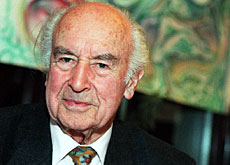Father of LSD takes final trip

Albert Hofmann, the Swiss scientist who discovered the hallucinogenic drug LSD, has died at his home near Basel aged 102.
Hofmann advocated the medicinal properties of the drug, which was embraced by millions of people in the 1960s hippie generation.
He died on Tuesday.
Born in 1906, the Swiss chemist discovered lysergic acid diethylamide-25 in 1938 while studying the medicinal uses of a fungus found on grain at the Sandoz pharmaceuticals firm.
He became the first human guinea pig of the drug when a tiny quantity leaked onto his hand during a laboratory experiment in 1943.
“Everything I saw was distorted as in a warped mirror,” he later wrote in a company memo.
“At home I lay down and sank into a not unpleasant intoxication-like condition, characterised by an extremely stimulated imagination,” he wrote.
Counter-culture
LSD initially enjoyed a quiet life as a psychiatric drug until it became the favoured drug of the 1960s counter-culture.
One of the leading advocates of LSD, Harvard professor Timothy Leary, embraced the drug under the slogan “turn on, tune in, drop out”. Leary came to Switzerland in 1971 after escaping from prison – for drug offences – in the United States.
Its widespread use by the flower power generation and the negative experiences of those who had a “bad trip” or disturbed reaction to the drug turned political opinion against LSD, leading to its prohibition at the end of the 1960s.
Hofmann remained convinced of the drug’s therapeutic properties for the mind and argued that it had proved successful in the treatment of people with psychological disorders.
“I hope that the medical profession gets official access again to LSD for the use as an aid to psychoanalysis,” Hofmann said in an interview with swissinfo in 2001. “Because under LSD patients could be healed.”
Research
Although Hofmann himself took the drug on an occasional basis for several decades, purportedly out of scientific interest, he was against the mass use of the drug.
The self-described father of LSD readily agreed that the drug was dangerous if in the wrong hands. This was reflected by the title of his 1979 book: LSD – my problem child.
Hofmann argued that the drug was not addictive and he repeatedly maintained the ban should be lifted to allow LSD to be used in medical research.
Hofmann lived to see his beliefs vindicated. Last December it was announced that the Swiss medical authorities had given a doctor approval to carry out LSD assisted psychotherapy trials on patients suffering from advanced-stage cancer and other terminal illnesses.
This is the first therapeutic study of its kind on humans for around 35 years.
Tributes
Rick Doblin, president of the Multidisciplinary Association for Psychedelic Studies, the organisation that republished Hofmann’s book on LSD, recounted on its website a recent conversation he had with Hofmann.
“[Albert and I] spoke on the phone the day after the Basel conference [March 2008] and he was happy and fulfilled,” Doblin said.
“I said that I looked forward to discussing the results of the study with him in about a year and a half and he laughed and said he’d try to help the research however he could, either from this side or ‘the other side’.”
Polo Hofer, one of the best-known rock musicians in Switzerland, said he owed Hofmann and LSD “moments of bliss and unforgettable experiences”.
LSD was popular among artists and non-conformists in 1960s Switzerland, but less so among musicians, Hofer told swissinfo.
“We read the books of Hofmann and Leary and prepared seriously for our psychedelic trips. We only then realised that Hofmann was Swiss.”
The Swiss government congratulated Hofmann on his 100th anniversary in 2006.
“He is a great figure in the exploration of human consciousness,” said Moritz Leuenberger who was President at the time.
swissinfo with agencies
Born on January 11, 1906, in Baden in Switzerland, Hofmann described himself as a philosopher early on in life.
He studied chemistry at the University of Zurich.
Hofmann spent most of his career working for the Basel-based pharmaceutical company, Sandoz (which later merged with Ciba-Geigy to become Novartis),
He authored more than 100 scientific articles and wrote a number of books, including LSD: My Problem Child.
A family man, Albert Hofmann died on April 29 at his home near the French border in Basel, Switzerland, where he lived with is wife Anita.
Lysergic acid diethylamide-25 (LSD) is synthesized from lysergic acid derived from ergot, a grain fungus that typically grows on rye.
Apart from generating a high, where the senses, perceptions and moods are intensified and altered, LSD can also cause terrifying “bad trips” in which the user suffers panic attacks or paranoia.
Although LSD showed promise as a tool in psychotherapy when it was first introduced, the drug is acknowledged to complicate mental health problems when used recreationally.
LSD is not considered an addictive drug.
But it was banned worldwide at end of the 1960s. It also gradually fell out of favour in the medical world. Sandoz stopped producing it in 1966.

In compliance with the JTI standards
More: SWI swissinfo.ch certified by the Journalism Trust Initiative












You can find an overview of ongoing debates with our journalists here . Please join us!
If you want to start a conversation about a topic raised in this article or want to report factual errors, email us at english@swissinfo.ch.